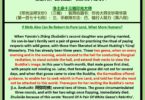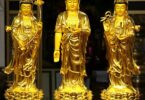[87] How I Guided My Beloved Grandma To Niànfó Sincerely
My beloved Grandmother passed away last week, having lived to the ripe old age of 96. As third-generation kin, although I had limited say over how her funeral proceedings were run, I tried my best possible to adhere to Pure Land practices. Special gratitude goes out to Teacher Shi’an for his very helpful resources (especially the BGRAAM sequence: purelanders.com/wake and testimonies collated at purelanders.com/testimonies), for guiding me on the proper Niànfó (念佛: mindfulness of Buddha) sequence, and for his readiness to address my various questions along the way.
When young, my Grandma was the first to induct me into the world of religious practices. As a sickly child, she was the one to lead me to temples, to carry out rituals in hope of seeking a cure for me. Indeed, she was as devout as a Buddhist layperson could be. It was only in 2019, when I attended Pure Land classes at Singapore Buddhist Lodge, that I realised Buddhist teachings did not involve drinking of water with ashes of burnt talismans, or swiping of joss paper against the face to chase away bad spirits.
Nonetheless, all of my Grandma’s actions were borne out of loving care for all our family members, with her wish for us to do well. Other than encouraging us to go vegetarian on the first and fifteen days of the lunar month, she also set our pet terrapins free and paid cash to relieve my brother’s losses. For her actions and teachings, which played an important role in my life, I will remain forever grateful.
Surprisingly, when I shared what I have learnt from my Pure Land classes with Grandma, encouraging her to focus single-mindedly on chanting of Āmítuófó’s (阿弥陀佛) name, she took it up immediately, dropping the other practices which she had adhered to for many decades. On the occasions when I visited her, she would thank me for teaching her the right way to Niànfó, and would comment joyfully on how some birds would flock to her clothes’ drying rack whenever she chanted. On a few occasions when she visited my home, she would chant religiously before the shrine for at least an hour. On one occasion, she broke down into uncontrollable sobs, which bore testament to her faith and connection to Āmítuófó.
About a month before her passing, my Aunt, who was her primary caregiver, commented on smelling the strong scent of ‘flowers’ on a few nights. This can be the auspicious sign (瑞相) of ’extraordinary fragrance filling the room’ (异香满堂), due to connection to Āmítuófó’s blessings. Being a Christian, she did not read much into this sign.
Two days before her passing, she chided my Grandmother who called out my Grandfather’s name, who had passed away more than 50 years ago. This was surprising as Grandma had not brought up my Grandfather for decades as they were not close. When my Aunt told her to focus on the living and to ignore the dead, Grandma was surprised that Grandpa had already passed on. On hindsight, despite my Aunt’s lack of Buddhist understanding, it was good that she reminded her to ignore ‘apparitions’ of past kin, which could be psychological illusions due to subtle attachment or manifested by karmic creditors (冤亲债主) to confuse, although it would be better if she reminded her to chant Āmítuófó’s name too, for instant protection and peace of mind.
When Grandma was admitted to the hospital on Monday night with an irregular heartbeat, I feared the worst as she had aversion to hospitals, having been admitted only once or twice before. She lost consciousness on the same night and passed away peacefully at around 6 am the next morning. As only five registered visitors could visit her in the ward, my Father stayed by her side with his siblings. Thankfully, my Father, although a non-practising Buddhist, did remind her to Niànfó mentally (in her unconscious state), as I had requested.
Upon her passing, arrangements were made for her embalmment as a 5-day wake was planned. It turned out that embalmment is not necessary for a 5-day wake, though it allows the viewing of her for many visiting friends and families. (Actually, seeing a photograph of her final peaceful expression should suffice.) I was disappointed to know that there was embalmment as it can cause magnified pain to the deceased if the consciousness had yet to depart from the body. Nonetheless, I used the BGRAAM sequence to Niànfó, to create the best chances of Grandma for reaching Āmítuófó’s Pure Land.
Having to deal with a constant stream of visitors walking by her casket while BGRAAM was in progress was a big distraction. However, I found it deeply comforting to keep vigil by Grandma’s side throughout the night, as this meant that I could concentrate better on Niànfó, and have Grandma’s full attention (if still present). I did this for two nights and was blessed to have a Dharma friend from Pureland Practice Fellowship guide me on the BGRAAM sequence as it was my first time doing support chanting (助念).
Due to my ignorance, while providing guidance on one occasion, I shared the address of a long-lost kin, in the hope that Grandma, if in the bardo (中阴) state, could visit the relative and obtain some closure. This was promptly and resolutely corrected by Teacher Shi’an, who reminded me to only encourage Grandma to let go of worldly attachments, so as to focus wholeheartedly on Niànfó to reach Pure Land, instead of sending her on a ‘worldly errand’. This is important as in the bardo state, karma can direct one to be reborn elsewhere at any time.
While we did not discern further auspicious signs so far, other than her peaceful passing, and while Grandma might have retained some attachment, especially to the long-lost kin, I believe in the ultimate benevolence and power of Āmítuófó. She had also long expressed her desire to join her own Mother in Āmítuófó’s Pure Land, and even a month before her passing, chanted fervently despite her weak state. These were all expressions of her ample Three Provisions (三资粮) of Faith, Aspiration and Practice (信愿行), the very requisites to reach Pure Land. Hence, I am sure that Āmítuófó will provide much-needed support in leading Grandma to his Pure Land.
Another important lesson I learnt is that it can be challenging to reconcile two polar perspectives. On one hand, speaking of worldly concerns, wake arrangements are for family members to have closure, thus needing some social interaction. On the other hand, speaking of spiritual concerns, funeral procedures should be focused on peaceful and close guidance of the deceased to Niànfó, so as to be reborn in Pure Land. While reasonably allowing the first, it should not have greater priority than the latter. With this experience and Teacher Shi’an’s valuable resources on hand, I feel more prepared to take up the role of a support-chanter again, should another family member eventually depart.
南无阿弥陀佛 : 净成
Námó Āmítuófó : Jìngchéng
11 January 2022MelvinKoh
相关文章
Related Articles:
Should The Deceased Be Guided To Do Anything Besides Niànfó?
应当引导亡者做念佛以外的事吗?
What Should Be The Focus Of Guidance Offered To The Deceased?
给与亡者的开示该专注什么?
https://purelanders.com/2022/01/11/how-to-offer-right-guidance-to-the-deceased
Amitābha Buddha’s Image’s Placement At Wakes
阿弥陀佛像在丧礼的摆设
https://purelanders.com/2022/01/11/buddha-image-placement-at-wakes
相关感应录
Related Testimony:
[107] Hop On The Pure Land Travelator And Hold On Tight
https://purelanders.com/2023/12/27/107-hop-on-the-pure-land-travelator-and-hold-on-tight





